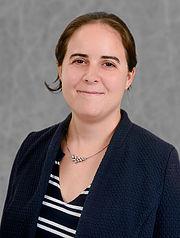Event
Organic Chemistry Seminar: Dr. Caroline Proulx
"New methods for the chemoselective functionalization of peptides"

Dr. Caroline Proulx
North Carolina State University
https://www.proulxlab.com/caroline-proulx-pi
"New methods for the chemoselective functionalization of peptides"
-Chemoselective reactions that occur under mild conditions are required to synthesize and functionalize biomolecules. To that end, ligation of a-nucleophiles with a-oxo-aldehydes or ketones have been pursued; however, addition of superstoichiometric amounts of aniline are typically required to construct oxime and hydrazone bonds at neutral pH via formation of an aniline Schiff-base intermediate. Moreover, while starting from ketone substrates instead of aldehydes would allow substitution at the site of ligation, synthetic challenges to access ketone derivatives from common amino acid building blocks and their slow reactivity in condensation reactions have precluded their widespread use in peptide ligations. Here, we expand the utility of oxime and hydrazone ligation reactions by providing direct access to reactive a-imino amide intermediates from a site-selective, aerobic oxidation of N-aryl peptides. We demonstrate that the reactivity of N-aryl peptides can be modulated by the electronics of the aryl ring, and that various substitution at the a-carbon can be introduced at the site of ligation in high yield. Efforts towards streamlining N-aryl peptide synthesis, as well as controlling the structural and conformational properties of ketoxime and kethydrazone-linked peptides will also be discussed.
Biography
Caroline Proulx obtained her Hon. B.Sc. from the University of Ottawa in Biopharmaceutical Sciences (Medicinal Chemistry) in 2007, working under the supervision of Prof. Robert N. Ben. In 2012, she obtained her Ph.D. in Chemistry from the University of Montreal under the guidance of Prof. William D. Lubell, where she worked on the development of methodologies for the combinatorial synthesis of azapeptides. From 2012-2016 she was an NSERC postdoctoral fellow at the Molecular Foundry, Lawrence Berkeley National Laboratory, working with Dr. Ronald N. Zuckermann on peptoid synthesis and self-assembly. She joined the faculty at North Carolina State University in July 2016 as an Assistant Professor. She received the LeRoy and Elva Martin Award for teaching excellence in 2019, the American Peptide Society Early Career Lectureship in 2021, and the NSF CAREER award in 2021.
HOST: Chenoweth
